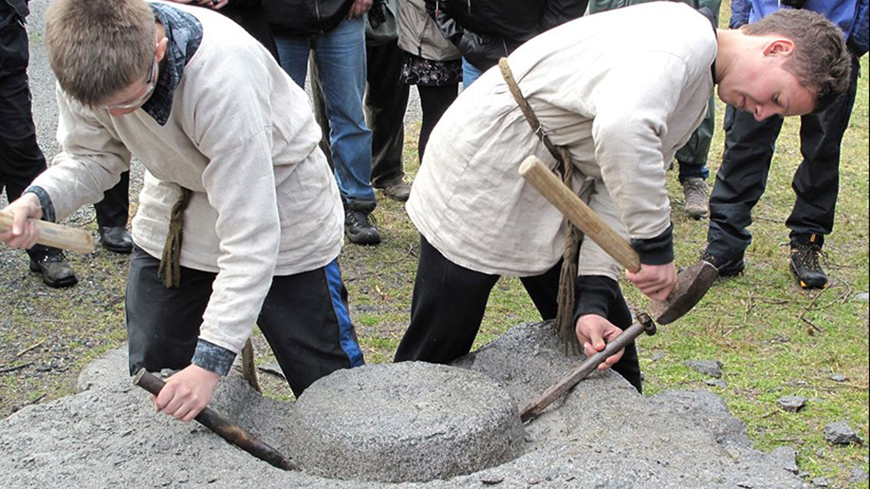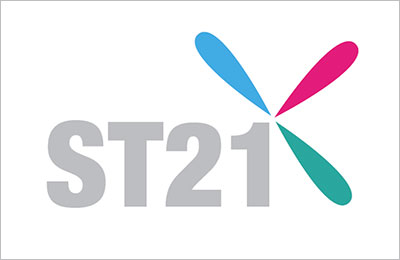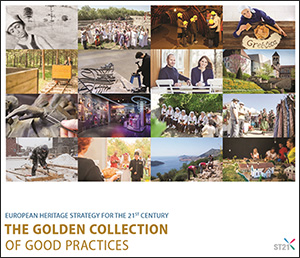Location of the initiative:

Relation to Strategy 21 Recommendations:
K1 - Incorporate heritage education more effectively in school curricula
Time span of the initiative:
Start Date: 2017 / End Date: 2020
Motivation / Methodology
It is a national ambition to encourage and allow school children to discover, explore and experience local heritage, and to incorporate knowledge about history and heritage in education. This is part of both heritage and education policies, and we seek to find practises, tools and methods to implement this.
The municipalities are responsible for primary schools, and also responsible for management of local heritage sites and monuments. So, how can we support local schools and at the same time strengthen the ties between local organisations, volunteers and school children?
The Cultural Schoolbag (TCS) is a collaboration between the central government of education, counties and municipalities, designed to ensure that children and young people experience professional art and culture. At the same time, it seeks to challenge the creativity of children and young people. The Cultural Schoolbag (TCS) is divided into 6 thematic fields (film, music, literature, visual art, performing arts and cultural heritage). The TCS offers two productions to every class and pupil every year during 13 years of primary and secondary education and is an important scheme and arena for the pupils to explore (local) heritage. Productions within the 6 different fields may be developed by professional artist, local associations etc, and is usually offered from the regional or local The Cultural Schoolbag (TCS) management in a catalogue at the start of each school year.
There has been a wish to develop more productions within the field of cultural heritage. In 2016, the Directorate for Cultural Heritage, The Museums Association, The Arts Council and Arts for Young Audiences Norway collaborated with the Historical Association in a pilot project aimed at developing local productions that may be part of the future repertoire of The Cultural Schoolbag (TCS). The local productions developed in that project were either a collaboration between museums and local historical associations or by the historical associations themselves (volunteers). This pilot was successful in several ways, and in 2017, the Historical Association were granted funding from the private The Savings Bank Foundation DNB for a three-year-project to stimulate local model-projects offered by local heritage associations for future productions within The Cultural Schoolbag (TCS) scheme. At the core of the project, lies the recognition that near every school, there are some heritage sites or monuments that may be activated as part of the education, and give the pupils historical and cultural insight and anchorage. An objective for the project is also to activate the historical associations and voluntary work in local communities in passing on knowledge and skills, and to support and encourage intergenerational dialogue (as many of the members and volunteers in the historical associations are elderly people). As the project is progressing, we see a variety of different productions in the making, such as historical plays, games, performing of trades and skills etc.
Obstacles / Barriers
These are some of the main challenges so far in the project period:
· When working with volunteers, always remember that they engage in voluntary work voluntarily. This means that we need to respect their role(s) as such, their reasons for engagement and interest, they are not an extra, free workforce.
· Also, respect the teachers role, and remember to include them, before, during and after the planned production.
· In this particular project: due to the organisation of The Cultural Schoolbag (TCS), it takes time from the development of the projects before they become part of the official programme/catalogue. This means we have limited experiences with the implementation/performance of the productions.
Change / Impact
· A wider range of options for local schools in engaging with local volunteers, exploring local heritage and history, thus strengthening local identity, involvement and ownership
· Providing school owners and teachers with tools and methods to connect pupils to the local heritage and volunteering community
· Expanding the base for the local volunteers and historical associations, expanding their relevance and “market of demand” thus building a stronger civic society
· Support and facilitate intergenerational dialogue and interaction
· This project is funded by private means, and gives important knowledge on financing models and cooperation between private organisations, volunteer work and public management
Lessons learned
Some of the lessons learned is built upon the experienced obstacles:
· When working with volunteers, always remember that they engage in voluntary work voluntarily. This means that we need to respect their role(s) as such, their reasons for engagement and interest, they are not an extra, free workforce.
· Also, respect the teachers role, and remember to include them, before, during and after the planned production.
· Children/pupils are very interested in local history and heritage. Finding the narratives that trigger their fascination, interest and will to explore is important, sometimes it is more important than historical facts such as names, years etc. A narrative that may link the histories and places to contemporary incidents, happenings, news etc. may be important.
· Quality in productions is of importance, both in terms of educational methods, historical knowledge and skills as performer/communicator.
Online resources
- https://www.facebook.com/riksantikvaren/
- https://www.instagram.com/riksantikvaren_offisiell/
- https://twitter.com/Riksantikvaren
- http://landslaget.org/index.php/blog/item/40-lokalhistorie-i-skolesekken-samarbeid-skal-gi-flere-skolebarn-gode-kulturarvsopplevelser
Contact information
Kari Larsen
Directorate for Cultural Heritage
[email protected]
https://www.riksantikvaren.no/en/
Source of financing
Private financing





